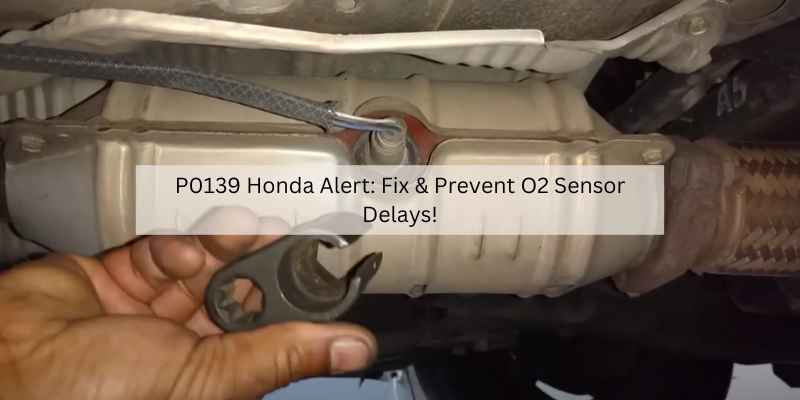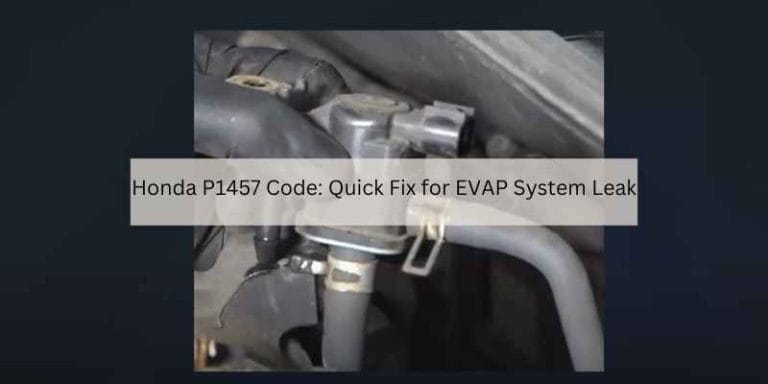P0139 Honda Alert: Fix & Prevent O2 Sensor Delays!
The P0139 code in Honda vehicles indicates a slow response time from the oxygen sensor. This typically signifies that the sensor is malfunctioning and may need replacement.
Understanding the P0139 code is essential for maintaining your Honda’s performance. This diagnostic trouble code (DTC) reveals issues with the oxygen sensor’s efficiency. Oxygen sensors play a critical role in monitoring exhaust gases, helping the engine run efficiently. A slow response can lead to poor fuel economy and increased emissions.
Ignoring this code may result in further engine problems and costly repairs. Drivers should promptly address the P0139 code to ensure their vehicle operates smoothly. Regular maintenance and timely diagnostics can enhance longevity and performance, making it crucial to stay informed about your car’s health.
Introduction To P0139 Honda Alert
The P0139 Honda alert indicates a problem with the oxygen sensor. This sensor helps manage fuel efficiency and emissions. A slow response from the sensor can lead to performance issues.
Common symptoms of the P0139 alert include:
- Check Engine Light on the dashboard.
- Decrease in fuel efficiency.
- Rough engine idle or stalling.
- Increased emissions and possible failure of emissions tests.
Addressing these symptoms quickly is important. Ignoring the alert can lead to more serious engine problems.
Root Causes Of O2 Sensor Delays
Wiring issues can lead to oxygen sensor delays. If the wiring is frayed, damaged, or saturated with oil, it can affect signal transmission. Regularly check the wiring to ensure proper function. Replacing or fixing damaged areas will help restore performance.
Exhaust leaks and catalyst damage also contribute to sensor problems. They can cause the sensor to read incorrectly. Proper repairs of exhaust leaks are essential for maintaining sensor accuracy. If the catalyst is damaged, it should be replaced to ensure optimal operation.
Diagnosing The Problem
To effectively diagnose the P0139 code, specific tools are essential. Begin with an OBD-II scanner to read diagnostic trouble codes. This tool helps identify issues related to the oxygen sensor.
Next, a multimeter is crucial for checking the sensor’s voltage and resistance. Ensure you have wire strippers and connectors for any necessary repairs. A mechanic’s stethoscope can also help detect sounds related to exhaust leaks.
Having a repair manual for your Honda model provides detailed instructions. Finally, a safety kit with gloves and goggles is important while working on your vehicle.
Effective Fixes
Wiring issues can lead to problems with the oxygen sensor. If the wiring is frayed or damaged, it affects signal transmission. Regularly check the wiring for any signs of wear. Replace or repair any damaged sections immediately.
Exhaust leaks can also trigger the P0139 code. A leak allows exhaust gases to escape, affecting sensor readings. Inspect the exhaust system carefully for any holes or cracks. Fixing these leaks is crucial for accurate performance.
Inspect the catalytic converter as well. A damaged converter can cause slow responses from the oxygen sensor. If issues are found, consider a full replacement to restore proper function.
Prevention Strategies
Regular maintenance helps avoid the P0139 Honda issue. Check your oxygen sensor regularly. Replace it if it shows signs of wear. Keep an eye on exhaust leaks and fix them promptly. A damaged catalyst can also lead to problems.
Detecting issues early is crucial. Look for frayed wiring or damaged connections. If the sensor’s signal is weak, the problem may lie there. Regular inspections can catch these issues before they worsen.
Cleaning the sensor can improve its performance. Ensure all connections are secure and free from oil. These simple steps can help maintain your vehicle’s health.
Replacement Costs And Considerations
Replacement costs for a Honda Accord oxygen sensor can vary. On average, expect to pay between $150 and $300 for parts and labor. Prices may differ based on location and mechanic expertise.
It’s essential to budget for repairs. Ignoring the P0139 code can lead to more significant issues. Always check for exhaust leaks and damaged catalysts. These problems can increase costs if not addressed.
Consider the following factors when budgeting:
- Labor costs: Typically $75 to $150 per hour.
- Parts quality: OEM parts may cost more but offer better reliability.
- Warranty: Some repairs come with a warranty. This can save future costs.
Professional Vs. Diy Repair
Deciding between professional repair and DIY can be tough. For complex issues, calling a professional is wise. They have the right tools and experience. This ensures a proper repair and saves you time.
Consider a professional when repairs require specialized knowledge. If you’re unsure about the problem, it’s best to seek help. Ignoring issues can lead to more damage.
For those opting for DIY repairs, safety is key. Always wear protective gear like gloves and goggles. Ensure the work area is well-lit and organized. Follow instructions carefully to avoid mistakes.
Check that tools are in good condition. This helps prevent accidents. If you feel overwhelmed, don’t hesitate to seek help.
Additional Resources
Online forums are great for Honda owners facing P0139 issues. Communities like DriveAccord.net and HondaCivicForum.com provide valuable advice. Sharing experiences helps identify common problems and solutions.
For tools and parts, trusted suppliers include O’Reilly Auto Parts, CarParts.com, and Amazon.com. These sites offer a variety of replacement parts and tools. Always check reviews for quality assurance.
| Supplier | Website |
|---|---|
| O’Reilly Auto Parts | oreillyauto.com |
| CarParts.com | carparts.com |
| Amazon | amazon.com |
Frequently Asked Questions
What Is The Code P0139 On A Honda Engine?
Code P0139 on a Honda engine indicates a slow response from the oxygen sensor. This often suggests the sensor is failing. It may lead to poor fuel efficiency and increased emissions. Regular diagnostics and sensor replacement are recommended to maintain optimal engine performance.
How To Fix P0139 Code?
To fix the P0139 code, inspect the oxygen sensor and its wiring for damage. Repair any exhaust leaks. Replace the oxygen sensor if it shows slow response. Clear the code and test drive the vehicle to ensure the issue is resolved.
Regular maintenance can help prevent future codes.
What Causes Slow Response From An Oxygen Sensor?
Slow response from an oxygen sensor often occurs due to frayed wiring, oil saturation, or exhaust leaks. Damage to the sensor itself can also be a factor. Regular inspections and repairs can help maintain optimal sensor performance.
How Much Does It Cost To Fix An O2 Sensor On A Honda Accord?
Fixing an O2 sensor on a Honda Accord typically costs between $150 and $300. This price includes parts and labor. Costs may vary based on location and mechanic rates. Always obtain quotes from multiple sources for the best deal.
Conclusion
Addressing the P0139 code in your Honda is crucial for maintaining optimal vehicle performance. A slow oxygen sensor response can lead to decreased fuel efficiency and potential engine issues. Regular inspections and timely repairs can save you from costly repairs down the road.
Stay proactive to ensure your Honda runs smoothly.







